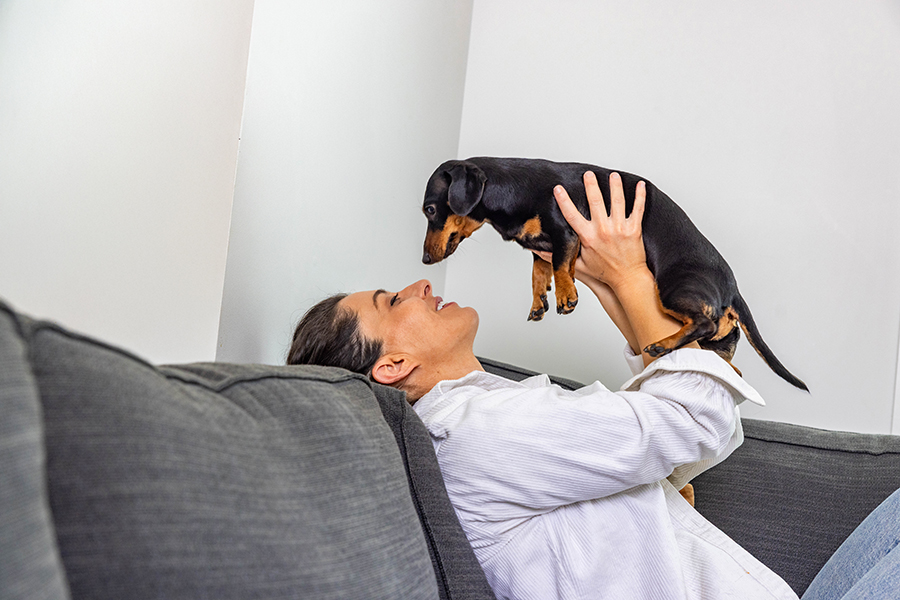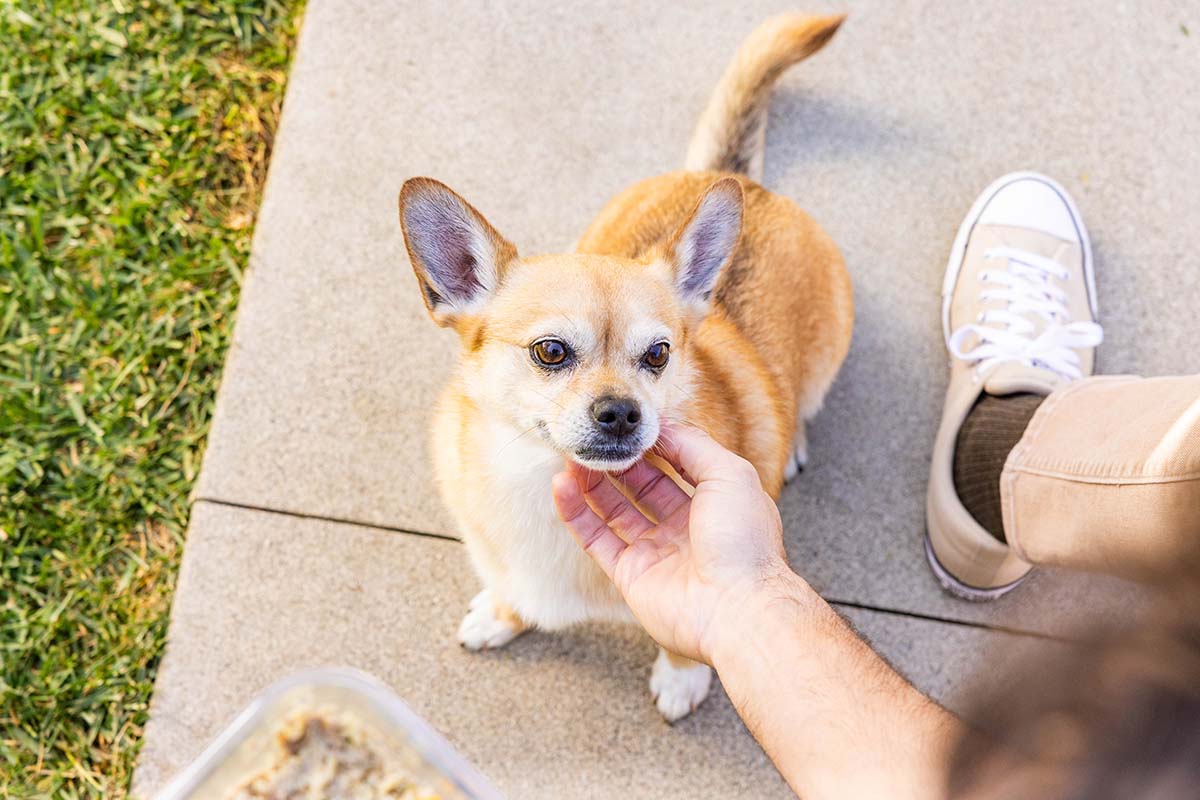Natural Calming Remedies for Dogs
Luckily, there are a number of natural remedies that may help soothe your furry friend's anxieties in order to keep them calm and collected.
Does your dog turn into a nervous wreck during thunderstorms? Maybe car rides send them into a tailspin? For many dog owners, dealing with a stressed pup can be a real challenge. Luckily, there are a number of natural remedies that can help soothe your furry friend’s anxieties and keep them calm and collected.
Recognizing the Signs of Anxiety

Not all anxiety symptoms in dogs are obvious. While the tail tuck and tremors are common signs, some are more subtle. Pet owners: pay close attention to your dog’s body language. An anxious or stressed dog may display:
- drooling
- lip licking
- excessive yawning
- hyperactivity
- hiding
- whale eye
By recognizing these symptoms early, you can get to work on stress relief techniques to help your dog feel safe again.
Creating a Calm Environment
Before diving into calming supplements and treats, it’s important to create a calming environment for your anxious dog. This means providing them with a safe space to retreat to during stressful times. Crates/kennels can be great for this, as long as your dog has positive associations with it. You can also use music therapy or white noise to mask anxiety-inducing loud noises.
Exercise Is Key
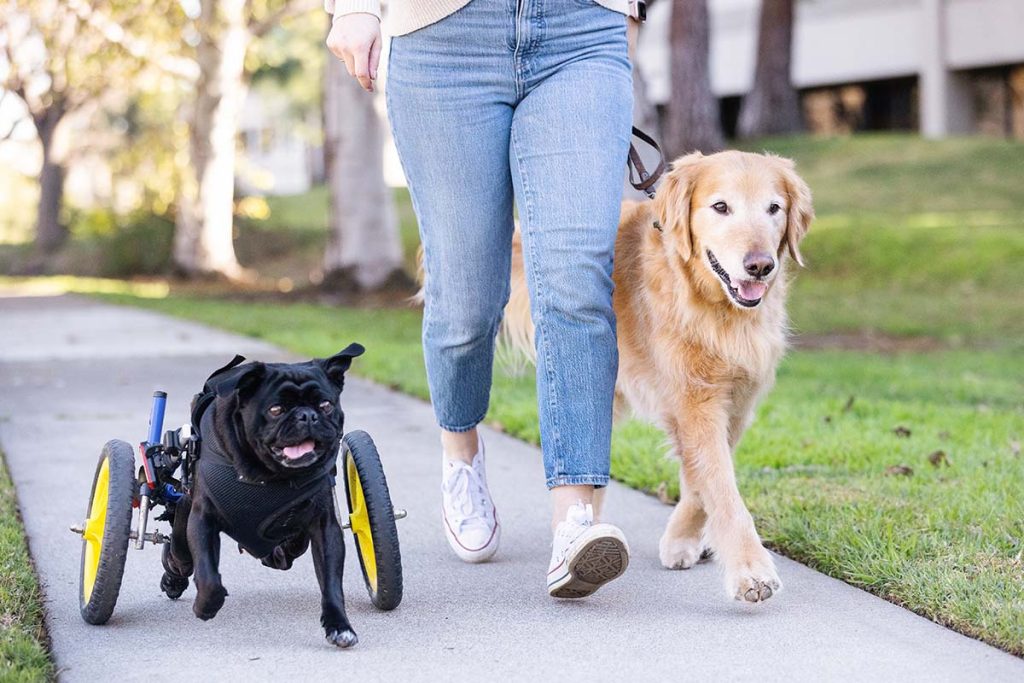
Always save time for exercise. A tired dog is a less stressed dog! And a less stressed dog is less prone to excessive barking and destructive behavior. Regular exercise is a fantastic way to burn off excess energy, reduce stress, and promote relaxation. Aim for daily walks or playtime sessions that get your dog’s heart rate up.
Mental stimulation is important too! Puzzle toys and interactive games can help keep your dog’s mind occupied and prevent boredom, which may contribute to anxiety. Check out these easy dog enrichment ideas.
Natural Supplements May Help Dogs Cope With External Stressors
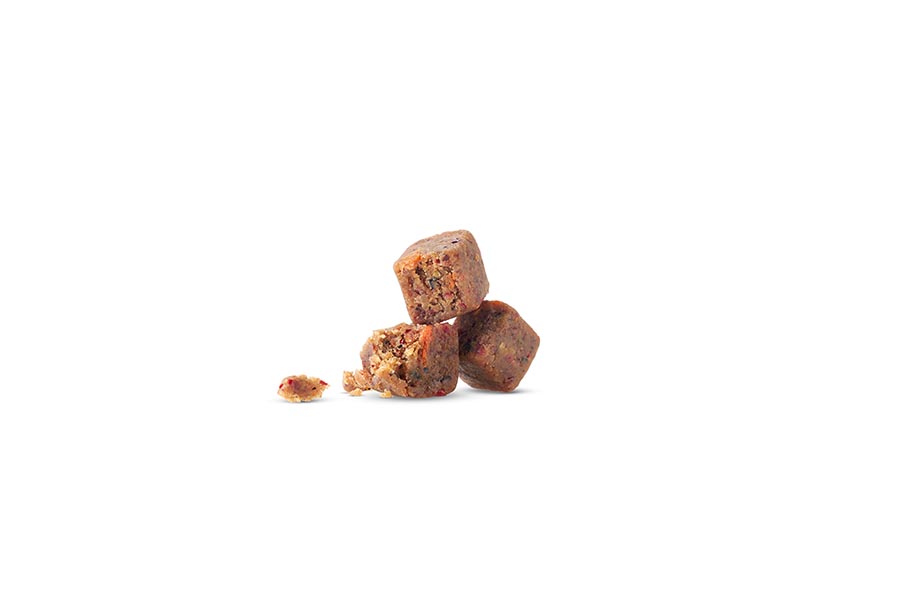
Several natural supplements and herbal remedies may help promote relaxation and support normal emotional balance. Here are a few of the most common:
- Chamomile: This herb has calming properties that may help promote relaxation. It’s often available in chew or tincture form.
- L-theanine: An amino acid found in green tea, L-theanine has a calming effect on nerves and can promote relaxation and feelings of well-being.
- Melatonin: This hormone helps regulate the sleep-wake cycle and may be helpful for dogs with nighttime anxiety or separation anxiety.
- Valerian root: Helps regulate nerve cells associated with anxiety.
- Passionflower: Supports optimal levels of GABA, a chemical that helps keep “happy” hormones stable.
It’s important to consult with your veterinarian before giving your dog any supplements. They can help you determine the right dosage and ensure the supplement won’t interfere with any medications your dog is already taking.
The Science Behind Calming Soft Chews
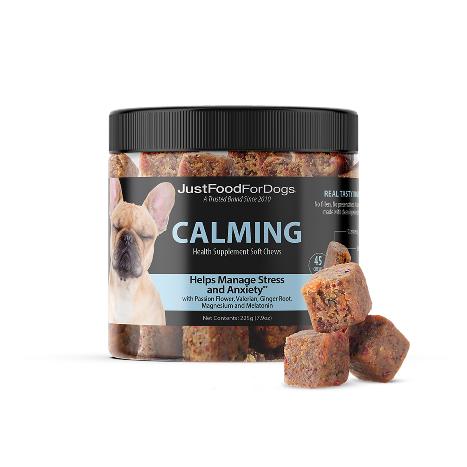
JustFoodForDogs Calming Chews were developed with a blend of clean, natural ingredients packed with micronutrients that work together to help your dog handle internal and external stressors. These tasty chewables help dogs maintain contentment during otherwise stressful situations such as separation, moving, vet visits, travel, and tension caused by changes in their daily routine.
Passionflower and valerian in this herbal supplement support optimal levels of GABA (gamma-aminobutyric acid), a chemical that prevents neurotransmitters like serotonin and dopamine (also known as “happy” hormones) from breaking down. Valerian helps regulate the nerve cells associated with anxiety to support overall relaxation.
These herbs, combined with ginger root, magnesium, and melatonin, create a dynamic calming supplement for dogs in the form of a delicious, low-glycemic soft chew. And it’s easy to administer because it tastes and looks like a dog treat!
Calming Sprays, Essential Oils, and Pheromones
Aromatherapy is another potential natural calming remedy for dogs. There are also several calming sprays, pheromones, and essential oil diffusers available that may help create a calming effect for your dog.
These products mimic the pheromones that mother dogs release to soothe their puppies. CBD oils and drops like dog-calming Rescue Remedy are other alternatives, but the scientific evidence of their effectiveness is mixed.
Thundershirt As a Calming Aid
Products like Thundershirts are another natural way to turn your antsy dog into a calm dog. They work by applying gentle pressure to your dog’s body, kind of like a swaddled baby. Research suggests that this type of pressure can release a calming hormone like oxytocin or endorphins.
Lick Mat
Licking is an activity that is shown to release endorphins and serotonin. Spread some peanut butter, wet dog food, or plain Greek yogurt on a lick mat and give it to your dog in a quiet space for them to enjoy. This can also help distract them during times of normal stress like nail clippings or baths.
Keep in Mind:
Natural solutions may not work for all dogs, and it may take some time to find what works best for your pup.
If your dog’s anxiety is severe, it’s important to consult with a veterinarian or animal behaviorist to develop a comprehensive treatment plan. If antidepressants or anxiety medications end up being the best route for your pup, that’s OK! Many nervous dogs thrive on prescription pharmaceuticals. Let your vet know if you notice any side effects.
With a little patience and some holistic calming techniques, you can help your dog stay calm and collected, even in the most stressful situations.
Citations
Akkoca Z, Yavuz B, Koçak Sezgin A, Bildirici Y. The effect of the swaddling method on stress levels in newborns administered nasal CPAP. BMC Pediatr. 2023 Dec 12;23(1):629. doi: 10.1186/s12887-023-04457-5. PMID: 38087248; PMCID: PMC10714443.
Murphy, K., Z.J. Kubin, J.N. Shepherd, and R.H. Ettinger. 2010. “Valeriana Officinalis Root Extracts Have Potent Anxiolytic Effects in Laboratory Rats.” Phytomedicine 17 (8-9): 674–78. https://doi.org/10.1016/j.phymed.2009.10.020.
This content is for informational use only and does not replace professional nutrition and/or medical advice, diagnosis, or treatment. It is not a substitute for and should not be relied upon for specific nutrition and/or medical recommendations. Please talk with your veterinarian about any questions or concerns.






